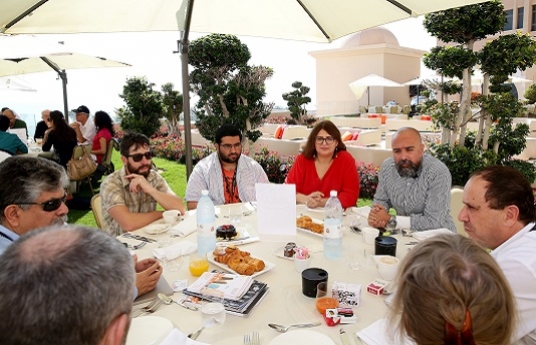Qumra sets a new model for developing emerging film talent, say industry experts
Mar 10, 2015

Film funding, legal aspects of international co-production and creating regional content among discussion points at Qumra industry programme
Doha, Qatar – 9 March, 2015: Industry experts and emerging filmmakers highlight Qumra, the new event by the Doha Film Institute, as setting a ground-breaking model for promoting the new generation of talent by offering “a real platform for networking.”
“The most important aspect of film events is to gain access to people,” observed Rashid Abdelhamid, the Palestinian producer of Dégradé, a Qumra Work in Progress project, one of 29 that are mentored by industry experts at Qumra. “The networking opportunities here are great.” He said that one of the first funding for the film with an all-women cast, directed by Tarzan and Arab Abunasser, came from the Doha Film Institute.
Set in a strife-torn neighbourhood, the film is an attempt, says Abdelhamid, “to prove myself that I am a human being. People are tired of all the distributing images they see every day from the region; we are attempting to find some humour in the crazy situation.”
The Doha Film Institute had extended similar funding support to Lisbon-born director Joao Salaviza for his feature-length debut, Mountain. The film’s producer, Francois D’Artemare, also highlighted the value that Qumra brings in making “new connections and identifying ways for newer collaborations.”
Anocha Suwichakornpong, writer-director of By the Time it Gets Dark, said the support from the Institute for her film, on which she had been working for nearly three years, “came as a big surprise.” She has been meeting a number of industry professionals, including potential sales agents at Qumra. “The nature of the film – [set in the 1970s about a less-known real incident with a fictional narrative of interwoven stories of several characters] – was very hard and all thanks to the Doha Film Institute for the support.”
Remi Bonhomme, Programme Manager, from the Cannes Critics Week, said the selection of films at Qumra Projects is very good, and that he arrived in Doha, despite the hectic schedule of screenings at Cannes, “to meet the filmmakers and answer questions.” He said that ten years ago, films from the Arab world were funded by non-Arabs, which would mean the “the stories are said from a European point of view for a European audience.”
Today, with support from entities such as the Doha Film Institute, Arab filmmakers can tell stories from their point of view, said Bonhomme, adding that at Cannes there is no distinction made in the selection of films – whether it is from the Arab world or by first-time filmmakers. “Every year, new ways of filmmaking evolve, the trends change year after year in every country, and the only way to know the trends is to meet the filmmakers.”
Nadia Dresti, Artistic Direction Delegate at the Locarno Film Festival, said Qumra offered a strong platform for two-way learning, by getting to understand the culture and the thought process of the region’s filmmakers.
Karel Och of the Karlovy Vary International Film Festival, said the festival is more open to Arab cinema, and being at Qumra has changed the perception of the industry. “Earlier, we would screen Arab films that were fished from major international film festivals alone, and that is clearly not enough.”
Roberto Olla, Executive Director of Eurimages, shared with emerging filmmakers the ABC of business affairs in international co-production, at a group tutorial, particularly highlighting the legal aspects. Defining co-production as one where there is co-ownership of rights, he explained the shifting trends in the European market.
An engaging group tutorial by script consultant Claire Dobbin had the participants break out into groups of three discussing how to develop plot lines and character lines. She said that the basic themes for films in the Arab world all are about universal issues, and the craft is in bringing a true Middle East perspective. She explained how to define the protagonists and antagonists in a story, how to define tangible goals for the protagonist, identifying his or her fears, and how to build on several crises towards the eventual catharsis.
Working breakfast meetings at Qumra had several industry delegates sharing views on diverse aspects of filmmaking with the participants. Teresa Cavina, Ali Al Jabri, Intishal Al Timimi and Alice Kharoubi of Abu Dhabi Film Festival, spoke about the festival and its Sanad development and post-production fund.
Nadia Dresti of Locarno explained how to launch their projects at the festival, while Savina Neirotti of Venice Film Festival, explained the making of a film with Biennale College. Paul Baboudjian of Screen Institute Beirut, shared insights on funding Arab documentaries, while Hossam Wahbeh of Al Jazeera Media Training & Development Centre, explained about training for Arab documentaries.
Joana Vicente presented details about the Independent Filmmakers Project, and Mirsad Purivatra shared informative insights on the Sarajevo Film Festival. Georges GOldenstern of Cinefondation at Cannes, offered insights on the selection process, and Matthieu Darras explained about developing film projects at Torino Film Lab.